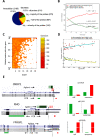Exosomes secreted by human cells transport largely mRNA fragments that are enriched in the 3'-untranslated regions
- PMID: 23758897
- PMCID: PMC3732077
- DOI: 10.1186/1745-6150-8-12
Exosomes secreted by human cells transport largely mRNA fragments that are enriched in the 3'-untranslated regions
Abstract
Small secreted membrane vesicles called exosomes have recently attracted a great interest after the discovery that they transfer mRNA that can be translated into protein in recipient cells. Surprisingly, we found that for the majority of exosomal mRNAs only a fraction of their corresponding probes is detectable on the expression microarrays. Exosomal mRNA fragmentation is characterized with a specific structural pattern. The closer to the 3'-end of the transcript the fragments are localized, the larger fraction among the secreted RNAs they constitute. Since the 3'-ends of transcripts contain elements conferring subcellular localization of mRNA and are rich in miRNA-binding sites, exosomal RNA may act as competing RNA to regulate stability, localization and translation activity of mRNAs in recipient cells.
Reviewers: This article was reviewed by Neil Smalheiser and Sandor Pongor.
Figures

References
-
- Johnstone RM, Adam M, Hammond JR, Orr L, Turbide C. Vesicle formation during reticulocyte maturation. Association of plasma membrane activities with released vesicles (exosomes) J Biol Chem. 1987;262:9412–9420. - PubMed
-
- Skog J, Würdinger T, van Rijn S, Meijer DH, Gainche L, Sena-Esteves M, Curry WT, Carter BS, Krichevsky AM, Breakefield XO. Glioblastoma microvesicles transport RNA and proteins that promote tumour growth and provide diagnostic biomarkers. Nat Cell Biol. 2008;10:1470–1476. doi: 10.1038/ncb1800. - DOI - PMC - PubMed
MeSH terms
Substances
LinkOut - more resources
Full Text Sources
Other Literature Sources

